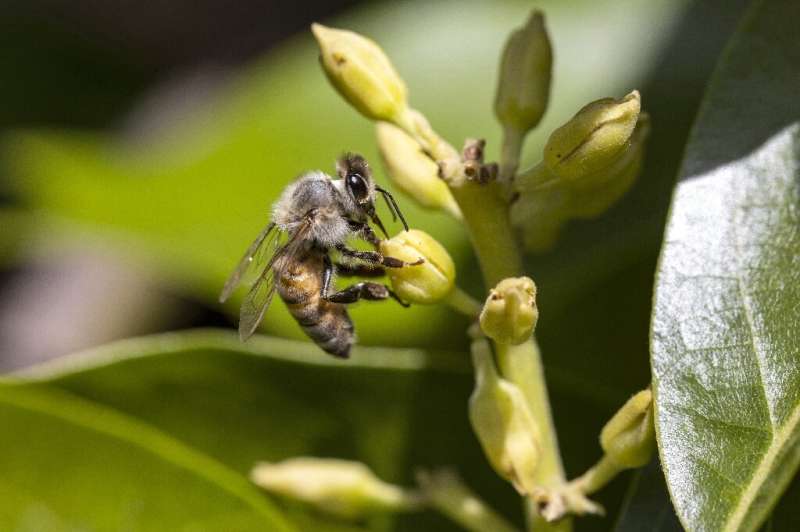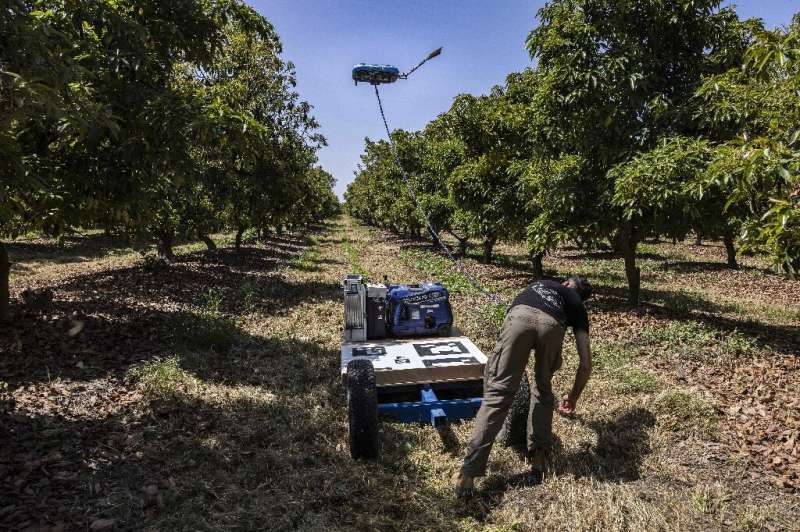As climate change and global population growth pose increasingly complex challenges for the agriculture industry, Israeli technology has emerged as a source of innovative solutions and advanced tools to help farmers adapt and thrive in these changing times.
In a picturesque avocado orchard located in a kibbutz in central Israel, a slow-moving tractor is seen pulling a unique device through the trees.
This peculiar device, resembling canoe paddles, delicately strokes the avocado plants with an electrostatic charge, effectively drawing pollen which then rubs off onto the adjacent row of trees.
The use of such artificial pollination methods has proven to be immensely beneficial in boosting crop yields, ensuring an adequate food supply for the growing global population, as highlighted by Thai Sade, founder and CEO of BloomX, an Israeli company specializing in this field.
BloomX utilizes cutting-edge algorithms to predict the optimal time for pollination, maximizing its efficiency and results.
Sade emphasizes the pressing need for these innovative pollination methods, given the shortage of pollinating insects and the increasing risks posed by global warming to their habitats.
He further explains that it is far more economically viable to optimize the utilization of existing orchards than to establish entirely new ones.
Avocado orchard manager, Ofri Yongrman Sela, acknowledges the challenges involved in managing the pollination process, highlighting its importance and the precariousness of relying solely on honey bees for this crucial task.
By incorporating BloomX’s technology alongside the natural efforts of honey bees, crop yields have increased by up to 40%, improving the overall productivity and sustainability of the orchard.

Farming robots
Amidst the lush avocado trees, Yongrman Sela reflects on the rapid advancements witnessed in the agricultural sector over the past decade.
Agriculture has undergone a revolution with the incorporation of various technologies such as sensors that measure soil parameters, drones, and big data analysis, permeating every aspect of the industry.
According to a report by Start-Up Nation Central, an Israeli non-governmental organization focused on promoting technology, there are over 500 agri-tech companies in Israel, showcasing the country’s prowess in this domain.
Shmuel Friedman, founder of Green Wadi, an agricultural consulting firm serving countries in Africa, Asia, and the Gulf, highlights the high demand for Israeli agricultural technology and expertise.
Friedman explains that Israel’s agricultural experience, combined with its powerful tech sector, has resulted in the creation of numerous innovative agricultural technologies that can propel farmers into a prosperous future.
One of the biggest challenges faced by the industry, as pointed out by Friedman, is the scarcity of available labor, particularly in developed countries.
To overcome this challenge, alternative solutions like farming robots and automated machines capable of replacing human labor are essential.

Fruit-picking drones
Yanir Maor recognized the need for alternative solutions over a decade ago when he watched a television program featuring 20 Israelis tasked with fruit picking.
Maor, founder and CEO of Tevel, decided to establish a company that utilizes drones for fruit picking, given the scarcity of available labor.
Anticipating a future with even fewer available workers and increased crop production, Maor emphasizes the importance of incorporating robotics in farming practices.
Tevel’s system involves eight drones connected to a platform that utilizes AI and machine vision to analyze images of the fruit provided by their cameras.
This advanced technology not only determines the ripeness of the fruit but also assesses its sugar content and identifies any diseases.
The drones employ a gentle suction mechanism to delicately detach the fruit from the branches and place it in a collection bin, with human supervision primarily for oversight.
This technology has been successfully implemented in Israel, the United States, Italy, and Chile, supporting the harvesting of over 40 different types of apples, peaches, nectarines, plums, apricots, and pears.
Maor explains that the Tevel system is entirely autonomous, capable of making decisions on fruit selection, detachment, and retrieval.
Yongrman Sela, the avocado orchard manager, expresses his excitement about the potential of these technologies in his traditionally “primitive” field of work and believes that this is only the beginning of many more groundbreaking advancements to come.
© 2023 AFP
Citation:
Israel enlists drones, AI and big data to farm for the future (2023, June 28)
retrieved 28 June 2023
from https://phys.org/news/2023-06-israel-drones-ai-big-farm.html
This document is subject to copyright. Apart from any fair dealing for the purpose of private study or research, no
part may be reproduced without the written permission. The content is provided for information purposes only.

